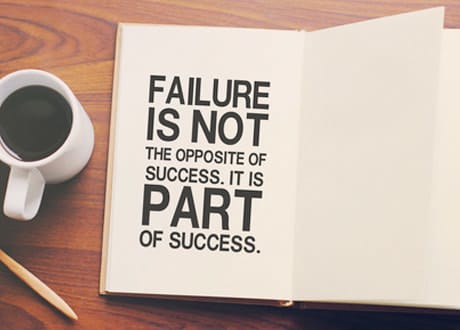So much is said, these days, about failure. Some people say, “I don’t believe in failure. I either succeed or I learn.” or I’ve heard, “Failure is a frame of mind.”. I’ve even heard people say, “There is no such thing as failure you’ve only found out how not to do something.” I call bullshit on those statements.

Failure or losing at something is the best teacher. And I think it’s important to identify failure as failure and not as something else. Failure needs to hurt. Failure needs to be painful. Because if it wasn’t, the lesson that you learn from it wouldn’t crystallize as well in your mind and what you take away from it wouldn’t be as powerful.
You’ll come to see that a man learns nothing from winning. The act of losing, however, can elicit great wisdom. Not least of which is, uh… how much more enjoyable it is to win. It’s inevitable to lose now and again. The trick is not to make a habit of it.” – Uncle Henry, A Good Year
A Story of Failure
I’ve failed in negotiations many times. I recall one occasion where I really and truly bombed and lost a few million dollars in one engagement. Stay with me, it gets worse. You see, as a category manager for a large company I was very used to having large negotiations very often. I was involved in some aspect of negotiation all day every day. I had a routine and I relied heavily on it. My routine was effective and it got me results. Amazing results. My results were so good that I stated to get cocky about my ability and my routine. That arrogance led to complacency and lulled me into a false sense of security about my routine. My arrogance got me in trouble.
I had a fairly large (multi-million dollar) contract renewal coming up with a vendor I had spoken to and negotiated with many times before and I figured I had this guy pegged. I knew the industry, I knew the market, and I thought I knew the vendor. I did no research going into the negotiation and figured I’d pull out another win without much issue. I was arrogant. And that arrogance led to complacency.
What had happened since the last time I negotiated with this vendor is that they had been acquired by a significantly larger organization and that organization had very aggressive profit goals and they were only interested in staying in markets and customers that gave them that margin. My vendor came into the negotiation ready to walk away (as were his instructions) if they didn’t get to their margin point. My arrogance and complacency led me to believe that I didn’t need an alternative to this vendor and that this vendor would very quickly succumb to my demands. How wrong I was.
It started cordially enough and once we started getting down to brass tacks. I slipped into my standard negotiating routine. He’d seen it before. The vendor, to his credit, said. “Look, I want to tell you right now that I came in for a significant increase and I will walk away if I can’t get it.” I thought, “I’ve seen this routine before. He’s clearly bluffing.” He wasn’t. He didn’t get what he wanted and I was too arrogant to change my routine and too blind to the situation to see that he wasn’t bluffing. Ultimately, he walked away. And yup, you guessed it, I didn’t have an alternate. And because I didn’t have an alternate, I had to crawl back to him with my tail between my legs to give him his increase. The increase cost the company I was with many millions of dollars.
I failed. Big time. I had let my arrogance develop complacency. And ultimately that led to a string of poor decisions. I chose not to do research, I chose not to develop an alternate, I chose not to slow the negotiation to do more research, I chose to view a warning as a bluff, I chose to run the same routine. I failed. But in that failure I learned a lot.
I learned humility. I learned to change up my routine. I learned to do the research, even if you think you already know what’s going on (because something might have changed). I learned that I should verify warnings that are made. I learned not to be complacent.
Now, will I fail again? Of course. And I’ve got bad news for you. If you really make negotiation a habit and you really practice it and apply the skills that you learn, the truth of the matter is that you’re bound to fail. Negotiation, which is fraught with traps and holes everywhere, is a minefield of potential failures. Failure is just something you have to come to terms with. But that doesn’t mean that you shouldn’t try and practice. All great negotiators have had and will continue to have failed negotiations. An honestly, that’s where you get the best lessons. That’s where you learn where a technique works or where it doesn’t.
Failure happens. It sucks, but it’s true. Call it what it is and learn from it.
